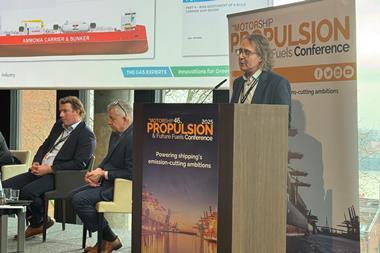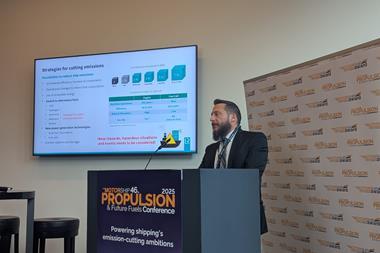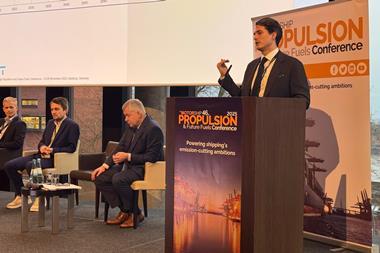At its annual press conference VDR President Gaby Bornheim said, “Without a strong and independent merchant fleet, there is neither economic stability nor national security – especially in times when geopolitical and trade policy risks are steadily increasing.”

The German Shipowners Association (VDR) is a key supporter of the Propulsion and Future Fuels conference, taking place in Hamburg from 25-27 November. It represents the German Shipping industry whose place in the global shipping industry remains high.
With nearly 290 shipping companies based in Germany, a fleet of 1,764 ships, and a gross tonnage (GT) of 47.4 million, Germany still ranks as seventh among the world’s leading merchant shipping nations this year.
Germany’s merchant fleet secures around 500,000 jobs in the maritime industry and serves as a vital transport link in times of crisis, ensuring the supply of essential goods, raw materials, and energy to the Federal Republic.
The Association recognised the rising tensions along key international maritime trade routes – from the South China Sea and the Taiwan Strait to the waters surrounding the Black and Red Seas and acknowledged that they are not only disrupting global maritime trade but are also posing a significant risk of attacks on German merchant ships and blockades of critical sea lanes for German imports and exports.
The VDR also warned that national interests must not come at the expense of free global trade flows. Additionally, increasing protectionist tendencies in global trade policy present challenges for German shipping. Higher tariffs and restrictive measures aimed at shielding national markets result in disrupted supply chains and rising transport costs. For shipping companies, this translates not only into potentially longer trade routes and higher operational expenses but also considerable planning uncertainty in global goods transportation.
These challenges are further intensified by recent protectionist announcements from the United States. The introduction of 25% tariffs on European goods, as announced by President Trump, as well as the U.S. plan to impose multi-million-dollar fees on China-built ships when entering U.S. ports, are causing significant uncertainty in the German and global merchant fleet. At the same time, it can no longer be ruled out that the U.S. government may increasingly withdraw from security commitments.
Thus, the need for Germany to secure its own supply in the long term is also growing. As a strategic response to the changing global trade and security architecture, it is essential to strengthen its own merchant fleet and ensure its continued existence.
“As a leading export nation with scarce natural resources, we rely on secure and open trade and shipping routes. A consistent national maritime security strategy, enhanced naval presence, and closer cooperation between security authorities and the merchant fleet are essential. Security comes at a cost – hesitation costs even more,” warns VDR CEO Martin Kröger.
These, and other important issues, will be fully discussed and updated at the Propulsion and Future Fuels conference in November in Hamburg.
To join the learning and discussions book Now
For all speaker interest and programme matters, contact:
Terri Metcalfe
Conference Producer
+44 1329 825335
TMetcalfe@mercatormedia.com








